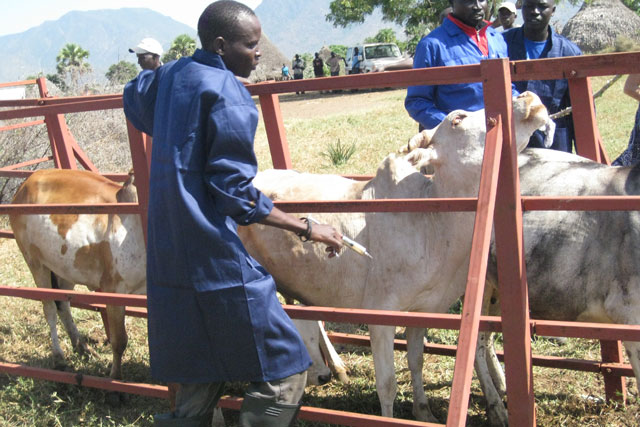The Kenyan government is piloting a livestock insurance policy to cover counties prone to dry weather such as Turkana, Wajir, Marsabit, Isiolo, Tana River and Mandera.
In this, the policy, will cushion farmers, help in repopulating their herds, help them stock animal feeds such as hay, construction of water pans to ensure animals don't die due to loss of pasture and water and breeding of hardy cattle.
In Kenya, severe drought results in up to 10 per cent mortality rate of livestock. Last year for instance 1500 livestock died in Baringo County due to drought that led to acute shortage of water and pasture.
The country is prone to flooding every year and chances of drought occurring every two to four years hence the need for an insurance policy.
Related
Water harvesting increases Mwingi farmer’s livestock herd
Livestock insurance takes risk out of livestock keeping
Cactus emerges as a feed for livestock
Herders in dry prone areas such as Turkana and Marsabit depend on pastoralism as their main source of livelihood in an industry that contributes four per cent to Kenya’s GDP according to the Kenya.
However in case of death of their animals they turn to subsistence agriculture growing crops such as kales, onions, tomatoes, pepper and maize but due to drought these crops are hard to grow and is not a sustainable source of income.

The Kenya Livestock Insurance Program is designed to use forage availability determined by data provided by satellite in determining whether to pay for a loss.
For a start, the national government will provide 100 per cent premium support for five tropical livestock units belonging to vulnerable pastoralists where the insuring companies in the private sector will make payouts directly to the accounts or mobile systems of the beneficiaries in case of a trigger under the public private partnership.
Interested farmers in selected regions are advised to visit the local chief’s office so as to fill the forms.
This comes at a time when the government of Kenya has moved in and compensated 24 families from Kajiado County with Sh53m to cushion them against loss of 1325 cattle that was taken away by the Tanzanian government in October 2017.
The herders were issued with the cheque on 2nd April by Deputy President William Ruto so as to help them restock their livestock and continue with their ordinary lives. This was after they failed to pay a fine of TShs500m (Sh23m) as ordered by an Arusha court for illegal trespassing in search of pasture and water.
In this, each family will receive Sh40,000 flat rate for each animal lost when the cows were confiscated and auctioned for being in Tanzania illegally.
Cattle are the most important source of red meat in the country supplying about 80 per cent of the animals for slaughter.
In 2016, 12,000 out of 14,000 pastoralists received a compensation of Sh215m from the government due to death of their cows due to drought.
Companies that provide livestock insurance in Kenya include Jubilee and Takaful amongst others.
















Comments powered by CComment